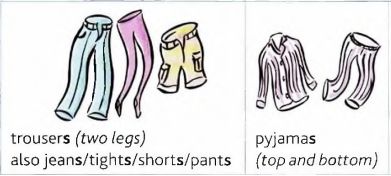A
Sometimes we use a plural noun for one thing that has two parts. For example:


These words are plural, so they take a plural verb:
- My trousers are too long. (not
my trousers is)
You can also use a pair of + these words:
- Those are nice jeans. or That's a nice pair of jeans. (not
a nice jeans) - I need some new glasses. or I need a new pair of glasses.
B
Some nouns end in -ics, but are not usually plural. For example:
| athletics economics electronics gymnastics maths (= mathematics) physics politics |
- Gymnastics is my favourite sport. (not
Gymnastics are)
News is not plural (see Unit 70B):
- What time is the news on TV? (not
are the news)
Some words ending in -s can be singular or plural. For example:
| means | a means of transport, many means of transport |
| series | a television series, two television series |
| species | a species of bird, 200 species of bird |
C
Some singular nouns are often used with a plural verb. For example:
| audience committee company family firm government staff team |
These nouns are all groups of people. We often think of them as a number of people (= they), not as one thing (= it). So we often use a plural verb:
- The government (= they) have decided to increase taxes.
- The staff at the company (= they) are not happy with their working conditions.
In the same way, we often use a plural verb after the name of a sports team or a company:
- Italy are playing Brazil next Sunday (in a football match).
- Shell have increased the price of petrol.
A singular verb (The government wants ... / Shell has .. . etc.) is also possible.
We use a plural verb with police:
- The police are investigating the crime, but haven't arrested anyone yet. (not
The police is ... hasn't)
Note that we say a police officer / a policeman / a policewoman (not a police).
D
We do not often use the plural of person ('persons'). We normally use people (a plural word):
- He's a nice person. but They are nice people. (not
nice persons) - Many people don't have enough to eat. (not
Many people doesn't)
E
We think of a sum of money, a period of time, a distance etc. as one thing. So we use a singular verb:
- Fifty thousand pounds (= it) was stolen in the robbery. (not
were stolen) - Three years (= it) is a long time to be without a job. (not
Three years are) - Two miles isn't very far to walk.
(American English -> Appendix 7)
79C
| BRITISH Nouns like government/team/family etc. can have a singular or plural verb:
|
| AMERICAN These nouns normally take a singular verb in American English:
|
※ gymnastics :
※ means :

intermediary : a. 중계의, 중재의 / n. 중계인, 중재자
(origin) inter(=between) + mediary(=middle)
(cf.) intermediate : 중간의 / 중급자
intermediary : adjective
1. helping other people or organizations to make an agreement by being a means of communication between them
- to play an intermediary role in the dispute
2. located or happening between two places, times or stages
- an intermediary stage of development
- Mountains were seen as an intermediary realm between heaven and earth. // realm : 영역
intermediary : noun (= mediator)
intermediary (between A and B)
1. a person or an organization that helps other people or organizations to make an agreement by being a means of communication between them
- Financial institutions act as intermediaries between lenders and borrowers.
means : ('intermadiary') 수단, 방법
- Email is a highly effective means of communication.
- We needed to get to London but we had no means of transport.
- Have you any means of identification?
- Is there any means of contacting him?
- Interest rates are used as a means of controlling borrowing. // interest rates : 이자율, 금리
- They are using peaceful means to achieve their aims.
- Music is the best means we have to reach a wide audience.
(Idioms)
by all means :
used to say that you are very willing for somebody to have something or do something (마음껏?)
- ‘Do you mind if I have a look?’ ‘By all means.’ // (have a look : 살펴보다)
by means of something :
with the help of something
- The load was lifted by means of a crane.
by no means | not by any (manner of) mean
- She is by no means an inexperienced teacher.
- We haven't won yet, not by any means.
※ mean :
mean : ('intermadiary, mind')
1. (verb) 의미하다, 의도하다(=intend), 수반하다(어떤 결과를 가져오다)
2. (adjective) 인색한, 박한(야박한)
3. (noun) 중간치, 평균(=average)
mean (between A and B)
- He needed to find a mean between frankness and rudeness.

'English Grammar in Use > Unit' 카테고리의 다른 글
| 081 : -’s (your sister’s name) and of … (the name of the book) (1) | 2021.10.31 |
|---|---|
| 080 : Noun + noun (a bus driver / a headache) (0) | 2021.10.31 |
| 078 : Names with and without the 2 (0) | 2021.10.30 |
| 077 : Names with and without the 1 (0) | 2021.10.29 |
| 076 : the 4 (the giraffe / the telephone / the old etc.) (0) | 2021.10.29 |

